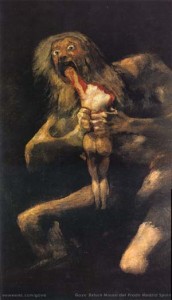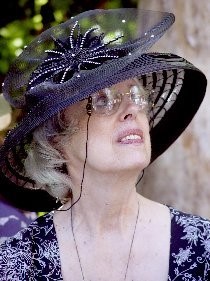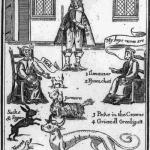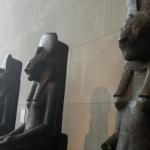The Delphic Maxims, as you may or may not be aware, were a set of almost 150 commandments written in the early 6th century BCE by seven wise men from all over the Greek-speaking world. They had been carved into stone and set in front of the holy Temple at Delphi and were used to teach some of the basics of the Greek language as well as to impart some wisdom to the public. I can imagine that its placement near the Temple allowed some who visited seeking wisdom could do so without needing to ask the Oracle. I believe that the work of the Seven Sages was directly inspired by Apollo, who often illuminates that which ought to be common sense. It seems to me that when you’re writing a set of commandments, the first thing you put down is going to be the most important thing that you want people to remember. The Abrahamics’ Ten commandments start with “(I am the Lord thy God.) Thou shalt have no other gods before me,” which is central to their belief systems. In a much longer list, you really want that first thing to convey something very important, in case your reader gets bored and wanders off. The Delphic Maxims begin with “Epou theo,” which is usually translated as “Follow God.”Not one to simply accept a translation as the correct one, I did some digging into what these two little words might mean and found that, much like the TARDIS, they’re bigger on the inside. Epou is a form of epw1 (read the “w” sort of like a long o), which does mean “follow,” but even in English, “follow” can have multiple meanings. It could mean literally to walk behind or accompany, like you’d follow someone to the kitchen for a glass of iced tea. In this sense, it was used as a stage direction, much like you would to say “Exit, pursued by a bear.” It could mean “to understand” as in “Yes, I follow you,” or to follow the motions of something, like in yoga class. It also means to follow as an attendant, escort, attend by way of honor, do the bidding of, obey, submit, come near or approach, or agree with. “Follow God” may sound simple at first, but what does it mean to follow God?
And to complicate things further, “theo” doesn’t just mean “God.” We’re talking about polytheists here, so it might be interpreted as “Follow Zeus.” But it doesn’t say “Epou Zeus,” it says, “Epou theo.” Given its placement in front of the Temple at Delphi, it could be interpreted as “Follow Apollo.” But it doesn’t say “Epou Apollon,” either. You’ll notice that “theo” isn’t capitalized, but it is in the masculine singular. Two Maxims down is the statement “Worship the Gods,” so it seems to be a little redundant on the surface.

Image via tripadvisor.com
I propose that this first maxim could be more accurately translated as “Follow that which is divine.” For a Free Hellenic such as myself, this might mean to look for the influence of the Theoi, who will always lead you to arête. For a Muslim, this might mean “submit to Allah,” a Christian might choose to interpret this as “follow the divine teachings of Jesus,” a Buddhist might follow their Buddha nature, an Atheist might follow the better parts of human nature in a metaphorical interpretation of “divine.” Lady Sheba’s Laws state “As a man loveth a woman by mastering her,/ So the Wicca should love the Gods by mastering them.” I’ve always interpreted “mastering” in this text as “come to understand” rather than “exert power over.” I wish I were more familiar with Norse practice to draw a similar parallel, but I’m almost certain “follow that which is divine” is going to have a ring of truth for them as well. (Any Heathens wanna help me out here?)
As a polytheist, I can have “and.” A simple phrase can mean all of these things and they can all be true. There can be many paths going up many different mountains and they can all be perfectly good paths and perfectly good mountains. In the Maxims, the Seven Sages didn’t specify a particular divinity you were supposed to follow or, in the third maxim, which gods you were supposed to worship. For a Hellenic who follows the Maxims, it shouldn’t matter. Existing as just one part of a pluralistic society comes as a natural extension of my Hellenism and interfaith work follows very easily from that. I see the other ladies at the Women of Faith meeting and I know that each, in her own way, is following that first Maxim.
Endnote:
1. Liddell, Henry G. and Robert Scott. A Greek-English Lexicon. Henry Stuart Jones and Roderick McKenzie, eds. Oxford. Clarendon Press. 1940. Reprinted by The Perseus Digital Library. Accessed 20 July, 2014
















